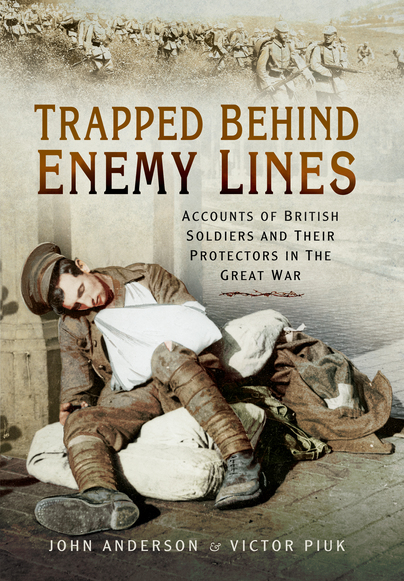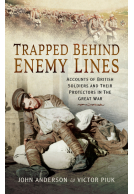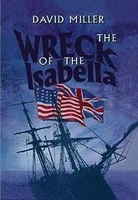Trapped Behind Enemy Lines (ePub)
Accounts of British Soldiers and their Protectors in The Great War
Imprint: Pen & Sword Military Classics
File Size: 15.8 MB (.epub)
Pages: 169
Illustrations: 16 pages of black and white plates
ISBN: 9781473874077
Published: 3rd November 2015
| Other formats available | Price |
|---|---|
| Trapped Behind Enemy Lines Paperback Add to Basket | £14.99 |
As 1914 ends, the war which was supposed to be over by Christmas, had settled down to an entrenched stalemate. Trapped behind enemy lines are many British soldiers who are hidden by brave French families. The risks are high for both fugitives and their protectors. This book tells their story, while focussing on a young Scot who emerges from hiding as Mademoiselle Louise, leading an amazing double life for almost two years, ending in betrayal. Sentenced to death by the Germans only an impassionate plea from his adopted mother saves his life. Others are not so lucky.
After the war he speedily returns from captivity in Germany, via Scotland to France and marries his sweetheart, but life remains hard in the war ravaged country. This extraordinary story was only revealed by a British journalist in 1927. The Daily Telegraph readers' response was overwhelming and culminated in our French heroines being feted on a lavish visit to London's Mansion House and an audience with the King, Queen, Prince of Wales and a three year old Princess Elizabeth.
Trapped Behind Enemy Lines covers an aspect of The Great War that has been overlooked. It will be of interest to those who love intrigue, adventure, love and betrayal.
As featured by
Stroud News and Journal, 6th February 2019
Article: 'The incredible story of a man trapped behind enemy lines' as featured by
Gloucestershire Gazette, 28th February 2019 – words by Huw Mabe
It is an exciting story to read; once started I could hardly put the book aside. In addition, the book is informative, well documented and contains gripping accounts of courage and sacrifice, as well as betrayal and treachery. 'Trapped Behind Enemy Lines' covers a previously overlooked aspect of the First World War.
Western Front Association, Dr. G. Timmermans
Trapped behind Enemy Lines is an account of British soldiers left behind in the retreat from Le Cateau in late 1914, their fate and the French and Belgium families who took them in despite great danger to themselves....
Peer Review - Will Davies
As might be expected, there is a plethora of books in this commemorative period about a whole range of aspects, events, units and battles of the Great War. This book however explores an unknown chapter of the war, in particular the British retreat in late 1914 when members of the BEF were left behind as the Germans pushed towards Paris. Many were captured, some summarily executed while others found refuge in the homes of local people in small towns like Le Cateau.
The book follows the story of David Cruickshank, a young Scottish private from Glasgow in the 1st battalion of the Cameronians (Scottish Rifles). The book follows his training and his embarkation for France. Landing in Le Havre as part of the BEF, he found himself in Le Cateau, at the time the British Headquarters of General Smith-Dorrien. Faced with either continuing the retreat or making a stand, Smith-Dorrien decided on the latter, hoping to not only stop the Germans, but to deal them a morale blow in being defeated by this small contemptable army.
This is an original and untold story of survival, evasion and fear and an illustration of the resilience of the British soldiers and the bravery of the local people and their contempt for the invading German army. The book is well researched, well written and very readable for a non-specialist readership. Both authors are accomplished battlefield guides so understand the broader context of the war and the ground and villages over which the war raged. It is a tribute to their skills that this book is as good as it is.
This book is a refreshing change from the prospect of endless money-driven regurgitations of the Battle of the Somme designed to monetize the centenary. It is born of the genuine interest and commitment of the authors to telling a fascinating story recounting the experiences of Private David Cruickshank who was left trapped behind German lines in 1914...The book provides copious details of life in the German-occupied town, something that was entirely new to me... The stories of several other soldiers are skilfully woven into the story... Pen & Sword deserve our warmest congratulations for bringing this fascinating story to a wider audience. A lovely book – off the beaten track and all the better for it.
GreatWarBookReviewPage - Peter Hart
A fascinating book whose origins were borne out of a chance purchase at a French brocante (flea market). The story follows the ordeals of a Scottish soldier (David) caught in enemy-occupied territory early in The Great War, his endurance, guile and bravery in existing in extraordinary circumstances of anonymous captivity.
Amazon Customer Review, R Wellings
However, whilst David's undoubted courage in surviving and gradually enjoying some crumbs of freedom is astonishing, it is the unenforced courageousness of his French guardians that makes this possible. With her own family members fighting the war and with young children to protect and feed, the true hero of this story is the matriarch of the household. Mme Baudhuin, probably buoyed by fears for her family members' fate at the front line of conflict, exhibits extraordinary bravery in protecting David.
I enjoyed how the book regularly sets the ordeals of the Baudhuin household within the wider context of the war, its developments and significant shifts in fortunes. It also introduces many parallel examples of despair, danger, courage and risk across the battlezone, each with their own specifc circumstances and outcomes. This prompts further inevitable thoughts of just how many thousands of similar but untold stories of bravery, hope, despair and elation have long disappeared into history.
Indeed, for me, this is the lasting legacy of a book that serves to honour and remember the courage of these remarkable French ladies. In a fitting conclusion the book describes how their efforts were eventually recognised and rewarded at the highest levels of authority in Britain. If reinforcement were needed, it provides another permanent reminder of the boundless qualities of human courage.
This book is a refreshing change from the prospect of endless money-driven regurgitations of the Battle of the Somme designed to monetize the centenary. It is born of the genuine interest and commitment of the authors to telling a fascinating story recounting the experiences of Private David Cruickshank who was left trapped behind German lines in 1914.
Peter Hart, Author & Historian
We start with a review of Cruickshank’s Glaswegian background and his training as a regular after joining the 1st Scottish Rifles in early 1914. Then brief historical sketches of the Battles of Mons and Le Cateau, firmly based in British-centric views and resplendent with the usual inflated German casualty figures. Still, this is just the aperitif to the main event. For one of the many Scottish Rifles reported missing in the subsequent retreat was David Cruickshank.
The differing stories of his first meeting with the woman who would be his saviour - Julie-Celestine Baudheim – are fascinating and the authors are sensible to be skeptical of the Boy’s Own version given to a journalist by Cruikshank in his later years, in contrast to the far more-measured account from Baudheim herself.
The book provides copious details of life in the German-occupied town, something that was entirely new to me. The risks taken by Baudheim, her family and friends were incredible as the Germans would shoot civilians for any real, or imagined, acts of defiance. Indeed, owning a carrier pigeon could bring the death penalty - never mind protecting fugitive British soldiers from capture. The subterfuge David Cruickshank adopted of dressing in drag is rendered more amusing by the inclusion of a photo of him as a POW – blessed with a full moustache!
The stories of several other soldiers are skillfully woven into the story. Time and time again, the sheer heroism of their civilian helpers and volunteers in the escape networks impresses, as they face death with no thought of reward. The whole of a community was tested by such situations and sometimes venal or jealous individuals reported the presence of soldiers to Germans. Indeed, Cruickshank himself was ultimately betrayed in September 1916. He was fortunate not to be shot – mainly due to a selfless emotional plea from his protector Julie-Celestine Baudheim – and both were imprisoned in Germany where they survived the war. In view of all she did, their subsequent post-war rift seems inexplicable. The reader may feel that it was ‘too little-too late’ when, in 1927, Baudheim and some of the other heroines were awarded with a small pension and an illustrated testimonial at a grand reception they attended in London organized by the Daily Telegraph whose readers had been inspired by the reports of their courage. It was the discovery of Baudheim’s testimonial that inspired the book.
Occasionally the lack of an editor is evident in the text – as in the statement that ‘much’ of the power and prestige of the British Empire was supplied by Glasgow. Any competent non-Glaswegian editor would surely have adorned the script here with a sardonic remark! However, while Pen & Sword may come in for some criticism, here they deserve our warmest congratulations for bringing this fascinating story to a wider audience. A lovely book – off the beaten track and all the better for it.
This is a book that will appeal to many people thanks not only to its intriguing content but the joint authors’ wonderful story-telling skills. It concerns a number of examples of British soldiers who were cut off from their units during the 1914 retreat from Mons and who found themselves isolated behind enemy lines. They were taken in by French people at great and increasing risk. These are not so much military stories, although the setting is of course during war, but they are stories of human courage, ingenuity, defiance, love and, in many cases, tragedy.
The Long, Long Trail
The book centres on David Cruickshank of the 1st Cameronians, who was cut off during the Battle of Le Cateau and taken in by Mme Julie-Celestine Baudhuin and her family. She had already lost her husband as a prisoner of war and, as we discover in the most painful circumstances, her son was killed in action. She fed and sheltered Cruickshank, cautiously sought medical help for him, and defied the Germans in many raids of her property. The occupying force became increasingly brutal in its treatment of both the evaders and their protectors. How Cruickshank evaded capture for so long is simply extraordinary – but no “spoilers” here, you’ll have to read the book!
It was almost inevitable that someone would eventually inform the enemy. Threatened with your life, or with the promise of rewards when you are destitute, perhaps you or I would do the same even in the knowledge of what a shameful act it was. Mme Baudhuin was sentenced to ten years imprisonment; her young son sent to forced labour; her 14 year-old daughter left to her own devices. Cruickshank, long since out of uniform, was initially treated as a civilian criminal and denied even the basic care accorded to POWs. He was at first sentenced to death but, surprising that it seems, was saved only by the German judge reacting favourably to Mme Baudhuin’s appeal for his life to be spared. Both survived their ordeals.
This core story is placed in a wider context of the progress of the nearby war on the Western Front, and is intertwined with other stories of British soldiers in a similar position. Some met terrible and unjustifiable fates; others came through the years of tension, fear and starvation. Gradually, escape networks were established but often all too fleetingly as the Germans discovered them, and arrested and often executed those who sought to help their British allies. The bravery of their French protectors is undoubted and should not be forgotten. This excellent, well researched and clearly written book does them proud. In Cruickshank’s case there is love, too, for very soon after the war he returned to France and married Aimee Olivier: of similar age to him, she had been a neighbour and confidant of Mme Baudhuin and had played a central part in the care of David whilst he was in hiding.
“Trapped behind enemy lines” also includes a very good selection of photographs, some of which are postcards or other images not before published. They include some of Cruickshank and his saviours, and of Le Cateau during occupation.
A great read and well worth buying.
As featured in
Daily Record (Glasgow)
What a wonderful read. The book held me and I was there in the rooms, the towns, the field “experiencing” what these poor people suffered. Apart from being informative it is at times deeply moving. Thank you for a great read but perhaps more importantly for making me and I am sure many others aware of the bravery, the selflessness and the care given to our soldiers by these French women. These non-combatant ladies who barely had food to feed themselves and their children yet cared for and sheltered our own soldiers, risking their own lives and the lives of their families to protect British soldiers separated from their units and “Trapped behind enemy lines”.
Brian Slee
When you quote General Spears at the end “…to keep their memory green will be to perpetuate the finest trait known to human nature. ‘For greater love hath no man than this’….” In my humble opinion your book ensures these ladies will never be forgotten. Thank you again.
About John Anderson
John Anderson was born at Alnwick, Northumberland. A former training and development consultant he now lives in the Somme area of France where he works as a full time battlefield guide and researcher. He is married to Kathleen and they have one son, Matthew.
About Victor Piuk
Victor Piuk was a journalist in his native Nottinghamshire before moving in 1999 to the Somme area with his wife Diane to run a B & B and conduct battlefield tours. This is his third book. When not leading tours he follows his beloved Mansfield Town Football Club and plays the guitar.
















